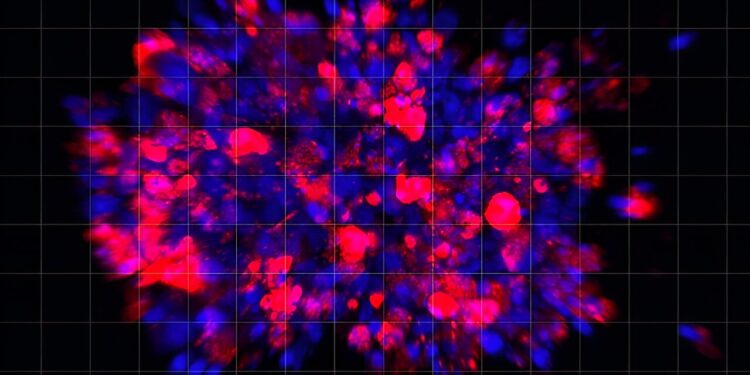Perhexiline maleate induces cell death in human pancreatic cancer organoids. (Red: cell death marker; Blue: DAPI). Credit: Xiaohua Duan
A drug screening system that models cancers using lab-grown tissues called organoids has helped uncover a promising target for future pancreatic cancer treatments, according to a new study led by researchers at Weill Cornell Medicine.
In the study, published December 26 in Stem cell, scientists tested more than 6,000 compounds on their pancreatic tumor organoids, which contain a common mutation that causes pancreatic cancer. They identified a compound – an existing heart drug called perhexiline maleate – that potently inhibits the growth of organoids.
The researchers found that the carcinogenic mutation in the organoids forces abnormally high cholesterol production, which the drug largely reverses.
“Our results identify overactive cholesterol synthesis as a targetable vulnerability in most pancreatic cancers,” said study co-senior author Dr. Todd Evans, vice chair of surgical research, Peter I. Pressman MD Professor of Surgery and a member of the Hartman Institute for Therapeutic Organ Regeneration at Weill Cornell Medicine.
“This study also highlights the value of using genetically well-defined organoids to model cancer and discover new treatment strategies,” said co-senior author Dr. Shuibing Chen, director of the Center for Genomic Health , of the Kilts Family Professor Surgery and member. from the Hartman Institute for Therapeutic Organ Regeneration at Weill Cornell Medicine.
A screening system based on tumor organoids
Organoids have become popular tools for studying healthy and diseased tissues. They can be made from human or animal tissue, they can recreate much of the complex architecture of an organ, and they can be genetically modified for precision modeling. Organoids can also model specific tumor types with their cancer-causing genetic mutations. Indeed, when these tumor organoids are derived from human tissues, they have the potential to model human cancers better than any animal model.
In the study, researchers established an automated organoid-based drug screening system for the most common form of pancreatic cancer, pancreatic ductal adenocarcinoma (PDAC), one of the most incurable cancers and the most deadly. The organoids, made from normal mouse pancreatic tissue, were engineered to contain diverse sets of mutations known to cause human pancreatic tumors. All organoids contained KrasG12D, the mouse version of a mutant cancer-causing gene found in most cases of PDAC.
The researchers tested a library of more than 6,000 compounds, including FDA-approved drugs, on the organoids, identifying several that could significantly disrupt their growth. The best of these was perhexiline maleate, an older drug used to treat angina. A modest dose of the drug blocked the growth of all KrasG12D-containing organoids, destroying some of them outright within days, while having no negative impact on healthy organoids lacking the mutation. The drug had similar effects against human and mouse PDAC-derived tumor organoids transplanted into mice, as well as against human tumor organoids carrying other types of Kras mutations.
By comparing gene activity patterns in treated and untreated organoids, researchers found that cancer-associated mutant Kras significantly increases cholesterol production in organoid cells and that perhexiline maleate antagonizes this effect by inhibiting a key regulatory factor in the cholesterol metabolic pathway called SREBP2.
Cholesterol, an emerging cancer target
The discovery of the role of cholesterol was not entirely surprising, since cholesterol is an essential element used in the manufacture of new cells and a promoter of cell survival; it is already known to be an important factor in the malignant growth of certain other tumors, notably lung tumors. Now, the results suggest that targeting it could be an effective new treatment strategy for PDAC.
The efficacy of perhexiline maleate in human organoids harboring several different Kras mutations also suggests that turbocharged cholesterol synthesis may be a general treatment target in KRAS mutant cancers.
“We hope that our cholesterol-targeting strategy will be independent of particular KRAS mutations and make it difficult for treated tumors to evolve resistance,” said Dr. Evans, who is also a member of the Sandra and Edward Meyer Cancer Society. Center.
Perhexiline maleate is unlikely to be used as is to treat PDAC. Although it is still prescribed as a medicine for angina in Australia and some other countries, it can have serious side effects, including liver and peripheral nerve damage. This is why it was withdrawn from several European markets in the 1980s and was never approved in the country. United States.
“We want a better compound for cancer treatment,” Dr. Chen said. The simplicity of the drug’s chemical structure suggests it can likely be modified to improve its potency, safety, blood half-life and other properties, she said.
The team now plans to use perhexiline maleate as a starting point for the development of a more refined PDAC drug candidate and as a laboratory tool to study cholesterol synthesis in PDAC and other cancers.
More information:
Xiaohua Duan et al, A pancreatic cancer organoid platform identifies a specific inhibitor of mutant KRAS, Stem cell (2023). DOI: 10.1016/j.stem.2023.11.011
Provided by Weill Cornell Medical College
Quote: Scientists use organoid model to identify potential new treatment for pancreatic cancer (December 27, 2023) retrieved December 27, 2023 from
This document is subject to copyright. Apart from fair use for private study or research purposes, no part may be reproduced without written permission. The content is provided for information only.



